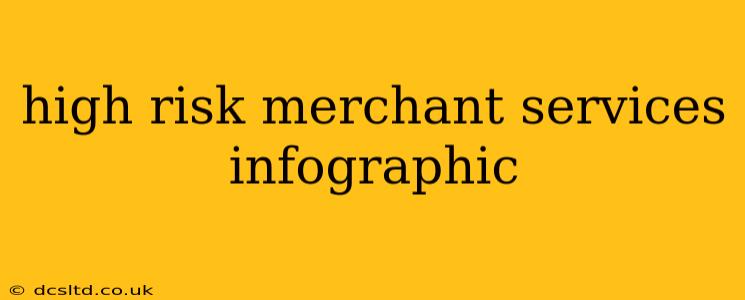High-Risk Merchant Services: An Infographic Guide
Finding reliable merchant services can be challenging for businesses considered "high-risk." This infographic-style guide breaks down the complexities, explaining what constitutes high-risk, the associated challenges, and how to navigate this landscape successfully.
What is a High-Risk Merchant Account?
A high-risk merchant account is a payment processing service designed for businesses operating in industries with higher-than-average chargeback rates, fraud potential, or regulatory scrutiny. These businesses are deemed riskier for payment processors because of the increased likelihood of financial losses due to factors like chargebacks, refunds, and potential fraudulent transactions.
Industries Often Classified as High-Risk:
- Adult Entertainment: The adult entertainment industry carries significant risk due to its nature and the potential for fraudulent transactions.
- Gambling: Online and physical gambling establishments face high chargeback rates and regulatory scrutiny.
- CBD/Hemp Products: The evolving legal landscape surrounding CBD and hemp products creates uncertainty and risk for processors.
- Pharmaceuticals: The sale of prescription drugs and other medications online poses significant fraud and regulatory challenges.
- Debt Consolidation: Businesses involved in debt consolidation can face higher chargeback rates due to disputes over services.
- Travel: The travel industry can experience high chargeback rates due to cancellations, disputes, and fraudulent bookings.
- Collectibles: The resale of rare items or high-value goods can attract fraudsters.
Why are these businesses considered high-risk?
- Higher Chargeback Rates: Higher-than-average chargebacks significantly increase the financial risk for payment processors.
- Increased Fraud Potential: Some industries are more susceptible to fraudulent transactions, impacting processors' bottom lines.
- Stricter Regulatory Compliance: Certain industries face stringent regulations, adding complexity and compliance costs for processors.
Challenges Faced by High-Risk Merchants:
- Finding a Processor: Securing a merchant account can be difficult due to increased risk aversion from traditional processors.
- Higher Processing Fees: High-risk merchants typically pay higher transaction fees to compensate processors for increased risk.
- Stricter Account Monitoring: Processors often implement stricter monitoring and compliance requirements for these accounts.
- Potential Account Termination: Accounts might be terminated if chargeback rates exceed acceptable thresholds.
How to Navigate the High-Risk Merchant Services Landscape:
- Thorough Research: Invest time in researching reputable high-risk merchant service providers. Look for established companies with a proven track record and transparent pricing.
- Transparency and Compliance: Maintain impeccable financial records and comply with all relevant regulations. This builds trust and reduces risks.
- Fraud Prevention Measures: Implement robust fraud prevention measures, such as address verification and advanced security protocols. This minimizes the likelihood of fraudulent transactions.
- Strong Customer Service: Excellent customer service can proactively address concerns and reduce chargebacks.
- Negotiate Fees: Don't hesitate to negotiate transaction fees with providers. Your volume and track record may allow for better rates.
Frequently Asked Questions (PAA):
What are the signs that my business might be considered high-risk? If you're in one of the industries listed above, or consistently experience high chargeback rates, your business is likely considered high-risk.
How much more expensive are high-risk merchant services? Fees vary significantly, but expect to pay considerably more than businesses with lower risk profiles. The exact cost depends on the processor, your industry, and your risk profile.
Can I still accept credit cards if I'm a high-risk merchant? Yes, but you'll need to find a specialized high-risk merchant account provider. Don't be discouraged; many processors cater specifically to these businesses.
What happens if my high-risk merchant account is terminated? If your account is terminated, you'll need to find a new provider quickly. Your ability to accept credit card payments will be temporarily suspended. This underscores the importance of maintaining a solid relationship and operational standards with your chosen provider.
Are there any alternatives to traditional high-risk merchant accounts? Yes, some alternatives exist, such as payment gateways and specialized payment processors. However, these solutions often come with their own set of limitations and considerations.
This guide provides a foundational understanding of high-risk merchant services. Always conduct thorough due diligence before selecting a provider and ensure full compliance with all relevant regulations.
